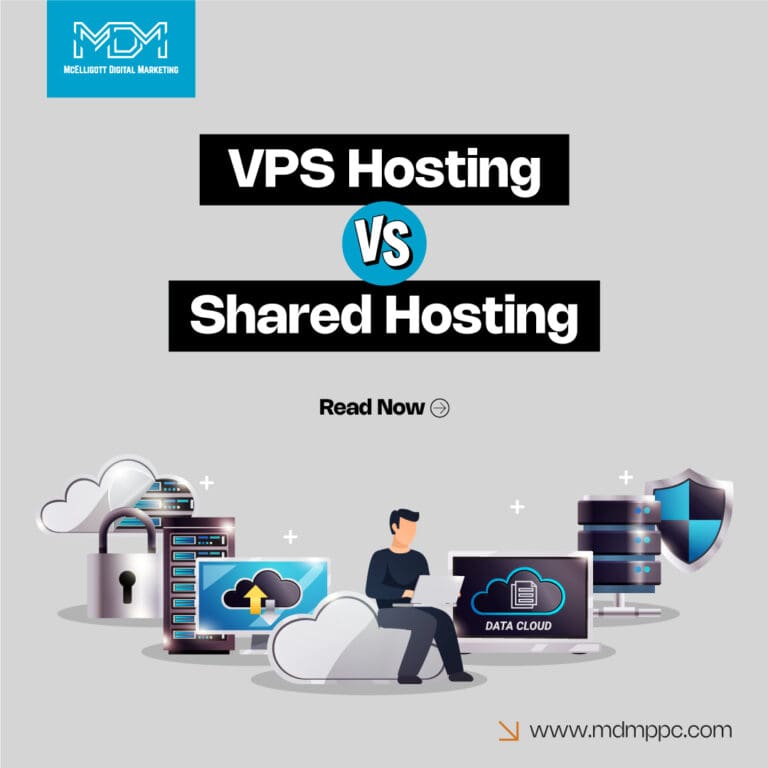Businesses of all industries have started to witness the importance of setting up and maintaining a successful website.
If you are one of those businesses looking to create a well-performing website for yourself, you must be looking at different hosting plans to support your website.
This blog will act as the perfect guide for you, telling you all about Shared hosting vs.VPS hosting to give you a comprehensive idea of which one is the best for your requirements.
What Is Shared Hosting?
If you are wondering what is shared hosting, it is an infrastructure where you get to access shared resources for your website.
Of all the website hosting options, shared hosting stands as the most budget-friendly option. Shared hosting allows multiple users to use the same host for their website, unlike a dedicated server or VPS plan which offers dedicated resources.
Unfortunately, this choice may result in limited bandwidth for your site and sluggish performance when a huge amount of traffic congests websites on a similar server.
When the pool remains uncrowded, you relish its enjoyment; however, one must still anticipate an eventual influx of traffic leading to overcrowded conditions.
Some of the reasons to consider shared hosting are if you have a small budget and have limited expertise. For users who are starting their blog, shared hosting might be the best option.
What Is VPS Hosting?
In VPS hosting, each user receives a designated set of resources while still sharing one physical server. This arrangement ensures that unlike with shared hosting, the performance of other websites on the server will not affect you. As a website host on VPS, you command your dedicated virtual partition guaranteeing consistent availability and access to necessary resources at all times.
Undoubtedly, VPS surpasses shared hosting in cost; moreover, its establishment necessitates advanced technical expertise–a solution ill-suited for novices.
If you want a hosting solution that would cater to your current as well as future needs, VPS is the one for you. For users who expect high traffic for your website, VPS is better suited.
Now, let’s take a deep dive into Shared Hosting vs.VPS hosting to know which one is the best for you.
Shared Hosting vs VPS Hosting: A Comparison
Shared hosting and VPS differ primarily in their customization options: shared hosting provides a pre-configured package that is ready for immediate use, yet limiting your ability to tailor it. On the other hand, VPS empowers you to configure it according to your unique specifications. However, due to its technical requirements, VPS hosting might not serve as an optimal choice for beginners who lack substantial familiarity with such setups.
In simple words, shared hosting is the more economical choice. It allows you to share a server with other websites; this grants you access to limited resources. However, by opting for this option and accepting the minor constraints on scale and performance, one can maintain their small website without significant financial outlay.
On the other hand, VPS hosting offers amplified freedom and superior performance; yet its benefits come at an escalated cost.
Here is how both of these hosting options are based on the following criteria:
Security and Performance
Owning any kind of website necessitates essential security measures. Both hosting types, as relatively secure and stable methods for your site’s host, exhibit certain differences; however, the choice between VPS and shared hosting largely depends on the need for dedicated resources and the hosting environment.
An error on another site may affect your site with shared hosting. Moreover, excessive consumption of the shared bandwidth by other sites could decelerate your website’s performance. This scenario becomes significantly crucial when your site experiences high traffic.
By employing a VPS, you can overcome this issue: the partitioned servers ensure optimal functionality for each website. Yet, lacking the requisite technical expertise to effectively manage your virtual private server necessitates careful consideration of available options; improper administration may lead to additional complications.
However poor management could potentially trigger further issues: thus highlighting your need to carefully weigh all potential outcomes before making any decisions.
Control
If you require advanced customization options for your site, opt for VPS hosting instead of a shared plan. This choice allows you access to root access to the server; thus, enabling installation of your preferred OS, control panel, and software enhancing both performance and security in a dedicated hosting environment.
Contrarily, a shared hosting plan confines you solely to standardized server setups; this could prove convenient for individuals disinclined towards independent server management tasks.
Server Administration
Should you opt for hosting your site through shared hosting, you will require minimal to no technical maintenance. The shared hosting providers shall undertake tasks such as setting up the shared server; and installing and upgrading essential software like cPanel or hPanel. Moreover, they diligently monitor servers to prevent downtime while efficiently managing backend operations.
Conversely, managing resources in VPS hosting presents a slightly more advanced challenge. This task requires an elevated level of expertise in administration and management. Luckily, with VPS hosting: you can customize and configure applications to enhance your website’s performance. If you are opting for non managed VPS, you can even get the root access. . Finally, tailoring the back end is entirely within your control which makes catering precisely to meet specific requirements effortless.
Scalability
Comparatively, caling up VPS hosting proves much easier than shared hosting. Optimal for short-term plans or small online websites, shared hosting may present performance difficulties when your site attracts high traffic volumes.
If you can predict the growth of your site, investing in VPS hosting might present a promising future: it allows swift and effortless scalability.
Pricing
Under this category, shared hosting indisputably emerges as the winner. Yet, VPS web hosting despite its higher cost manages to justify a significant advantage.
VPS hosting, though it incurs a modest cost escalation compared to shared plans, provides significantly increased storage space and bandwidth.
For easy reference, here are some of the advantages and disadvantages of shared hosting vs.VPS hosting:
Shared hosting:
| Advantages | Disadvantages |
| More beginner-friendly hosting solution | Often has less bandwidth and storage than VPS |
| Provides a standardized setup | Is prone to errors when there is high traffic |
| Requires less technical expertise | You have limited access to the back-end |
| Least expensive of all hosting options | nil |
VPS hosting:
| Advantages | Disadvantages |
| Non-managed VPS hosting grants you root access to your server. | Comes at a slightly higher price |
| More memory and bandwidth, easily scalable | Needs technical expertise to manage well |
| Much more stable and faster than shared hosting | |
| It is not affected by other site’s traffic |
When to Upgrade Your Hosting Plan?
Are you currently utilizing shared hosting and finding it enjoyable? If so, the question of when to upgrade to a VPS hosting plan may arise. Consider these questions:
- Do I want more options and freedom for managing my server?
- Will I get a substantial increase in traffic in the future?
- Am I hosting more than one website someday?
You can reap significant benefits from both shared and VPS hosting options, regardless of your choice; all you need to do is carefully consider and evaluate your options.
Additionally, if you need more help, we are here.
At McElligott Digital Marketing, we provide comprehensive WordPress Website Hosting services to businesses to optimize their website. Check our website to know all about our services!
We also help you buy a domain name for your business!
After choosing the right hosting solution, you will need to know everything about website design to make your website more appealing. Read our guide to get a holistic view of website design.
We would love to be a part of your business’s growth. Contact us today to get started!
FAQs
Is shared hosting slower than VPS?
VPS Hosting offers better performance owing to the proper partitioning of resources. Shared hosting might lead to slower output. You can opt for both of these hosting solutions based on your priorities and budget.
Which is better VPS or cloud hosting?
All hosting solutions have their own merits as well as demerits. Cloud hosting offers a notch higher performance and better speed as compared to VPS hosting. But VPS suits businesses that want better security for highly sensitive data.
Are there other web hosting types?
Besides Shared and VPS hosting, you can explore dedicated and cloud hosting services. Dedicated hosting lets you access all available resources and cloud hosting lets you manage your website on cloud servers.
Do I need VPS hosting?
You might need VPS hosting if you want a better-performing website or if you are expecting more traffic to visit.
How many users can a VPS host handle
The number of users a VPS host can handle depends on the quality of the website. On average, you can expect your VPS host to handle from 10,000 to 50,000 daily visitors.





